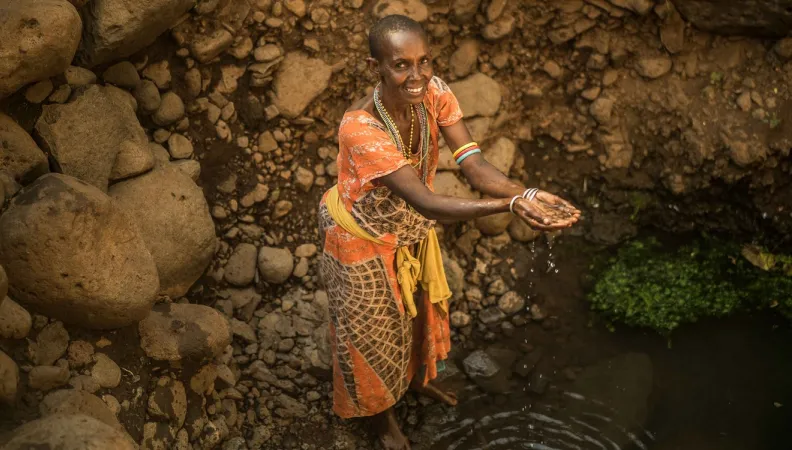Share the page
“Water is Central to Achieving the Sustainable Development Goals”
Published on

The United Nations Water Conference, being held in New York from March 22 to 24, seeks to reinforce efforts to ensure universal access to safe water and sanitation by 2030. Water is important not only for the obvious health benefits; they are linked to several other Sustainable Development Goals. AFD’s head of AFD's Water and Sanitation Division, Lionel Goujon, outlines the main related development issues.
What makes water essential to achieving the various Sustainable Development Goals?
Water is a key factor in determining whether and how the SDGs are fulfilled. There is a clear link between access to water and the eradication of hunger and poverty, for example, as it improves food security and nutrition, through direct consumption and indirectly via agricultural production.
Climate change is exacerbating water shortages and stressing aquatic environments and biodiversity. And with water shortages increasingly common, access can be a source of conflict. Better water management however, can improve relations between communities. Our projects in this sector are also making an impact in terms of gender and health.
Developing safely-managed water and sanitation services is a guaranteed strategy for improving public health, namely by limiting the spread of waterborne diseases (such as cholera, diarrhea, dysentery and hepatitis A).
AFD co-financed an impact study by the London School of Hygiene & Tropical Medicine in Uvira, in the Democratic Republic of Congo, which analyzed several years of data from the Cholera Treatment Center. This study found that improving the quality of water services has a positive impact in terms of limiting the prevalence of cholera and diarrheal diseases.
What action has AFD taken in the water and sanitation sector?
With the pandemic, rising inflation, and conflicts afflicting a number of countries, AFD sustained its support for the water sector in 2022, committing €1.2 billion in financing, which represents about 10% of the Group’s activity, having already signed off on €927 million.
In Africa, financing last year reached an all-time high of €610 million. AFD has financed several initiatives across the continent, such as a project to mitigate the risk of conflict caused by water shortages in Mauritania (grant of €14 million), a program focused on empowering women in Côte d’Ivoire (loan of €130 million), and a project to combat drought in Angola (loan of $150 million).
AFD is also financing a sanitation project in Chattogram, Bangladesh, which is set to have significant benefits for public health.
See also: Water and Sanitation: Our Commitments in 2022 for Impact in 2023
This financing targets the three key pillars of AFD’s new strategy, published in February 2022, which guides our work: reducing inequalities in drinking water and sanitation access, taking action at the local level to improve climate and ecological resilience, and strengthening governance to ensure efficient and sustainable services.
This funding also focuses on the three drivers identified in the strategy: partnerships, innovation and knowledge and the approach has been adapted from France's International Strategy for Water and Sanitation 2020-2030 and adopted at AFD on a group-wide level. https://www.diplomatie.gouv.fr/en/photos-publications-and-graphics/publications/article/france-s-international-strategy-for-water-and-sanitation-2020-2030
How can financing in this sector be increased?
Several studies have cited a substantial gap in the financing required to achieve SDG 6: “the availability of water and sanitation for all”, and the sector continues to be underfunded.
To compensate, action must be taken in several key areas, from optimizing service performance and costs while increasing returns to striking the right balance in each local community between costs and financing.
A balance between water rates (bills paid by users), taxes (subsidies from the general budget) and transfers (international development aid contributions) must be found, to provide the self-sustaining financing that allows for the maintenance and improvement of infrastructure, and above all, good quality water services. Reimbursable financing, especially in the form of loans, can also support the water sector.
A study commissioned by AFD as part of the Finance in Common initiative, has demonstrated that public development banks (PDBs), and particularly national PDBs, can play a significant role in achieving SDG N° 6 by raising more financing and thus boosting investment in water and sanitation. Which is why AFD founded the Water Finance Coalition, made up of more than 50 PDBs. The purpose of this coalition is to encourage PDBs to play a wider role in the water and sanitation sector, and to provide support.
